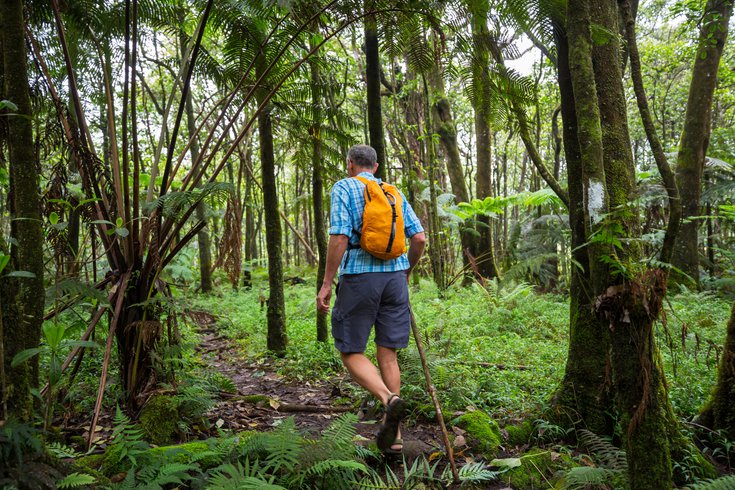
April 08, 2021
 Source/Image licensed from Ingram Image
Source/Image licensed from Ingram Image
The health benefits of nature is quite evident. People who spend two hours a week in green spaces tend to have a higher sense of well-being, research has found.
Spring always brings a fresh sense of well-being with the opportunity to get outdoors. This year, spring has a particularly strong appeal as we struggle to emerge from a year of COVID-induced isolation and stress in our lives.
Turns out, if you’re looking for the antidote to the physical and mental duress imposed by the pandemic, or just ready to jump-start a healthier lifestyle, the science suggests that increased access to nature can provide you the edge to become more active and trigger a broad range of physical and mental health benefits. This includes interactions with nature in urban areas.
According to the U.S. National Park Service, exercising in nature leads to greater health benefits than performing the same activity indoors, and individuals are more likely to repeat being physically active when the exercise is performed in a natural environment. The NPS further indicates that a 30-minute visit to a park can improve heart health, circulation and lower cholesterol, blood glucose and blood pressure. The NPS reports that walking in nature reduces inflammation and boosts your immune system, which decreases the risk of certain diseases and cancers.
A report published by the Nature Conservatory cites a study that found residents living in areas with more green space were more than three times as likely to be physically active, and approximately 40% less likely to be overweight or obese, as those living in areas with low levels of green space. A striking statistic when you consider the level of obesity in America today.
A Harvard Medical School publication offered a specific look at the risks of mood disorders in aging men resulting from sudden life changes such as the death of a loved one, unemployment or retirement. It paid particular attention to men who may not want to turn to medication and therapy for help. For these individuals, interacting with nature is one of the best self-improvement tools they can use; it's what the experts call ecotherapy. Harvard says that the type of nature setting doesn’t matter and that, as an example, group nature walks are just as effective as solo treks.
Supporting this position is a Yale University publication that describes a study where people who spent two hours a week in green spaces — local parks or other natural environments, either all at once or spaced over several visits — were substantially more likely to report good health and psychological well-being than those who did not. Labeling its review of nature-based literature ecopsychology, the article presents a laundry-list of benefits associated with time in nature including lower blood pressure and stress hormone levels, reduced nervous system arousal, enhanced immune system function, increased self-esteem, reduced anxiety and improved mood.
Consistent with the multi-faceted benefits of a healthy lifestyle, Colorado State University describes a number of benefits associated with interacting with nature. Among them: nature decreases stress, the outdoors makes you feel energized, being in nature can help "clear your head," and interactions with nature can help you recover from mental fatigue.
Seems time in nature has additional benefits. Research conducted at the University of Kansas concluded that people from all walks of life showed startling cognitive improvement — for instance, a 50% boost in creativity — after living for a few days steeped in nature. Researcher Ruth Ann Atchley said that nature could stimulate the human mind without the often-menacing distractions of workday life in the 21st Century.
"Nature is a place where our mind can rest, relax and let down those threat responses," Atchley said. "Therefore, we have resources left over — to be creative, to be imaginative, to problem solve — that allow us to be better, happier people who engage in a more productive way with others."
As a practical matter, if you are like me, you may not be able to fully remove yourself from daily life and immerse yourself in nature, but, then again, spending time in a nearby park may just do the trick.
For me, my connection to nature is running along the Cooper River in New Jersey and on the promenade in Sea Isle City. Whether I'm looking at the river or the Atlantic Ocean, there's that intangible benefit that just doesn't compare to the treadmill at the gym.
Yes, the practical fact is that I rely on the treadmill to get through the winter and when time requires immediate access to the accoutrements of the gym. But when there's time and the weather is good, there is nothing like looking over the water and soaking in all that nature has to offer as I run along my path. With Wi-Fi in the park and along the promenade, depending on the time and my mood, I really enjoy the music or news as a complement to the setting. The combination takes the workout to another level.
Mother Nature is looking out for us and helping in her own special way. Regardless of how you choose to interact and what activity works best for you, take advantage of what Mother Nature has to offer. The time is right.
Louis Bezich, senior vice president of strategic alliances at Cooper University Health Care, is author of "Crack The Code: 10 Proven Secrets that Motivate Healthy Behavior and Inspire Fulfillment in Men Over 50." Read more from Louis on his website.